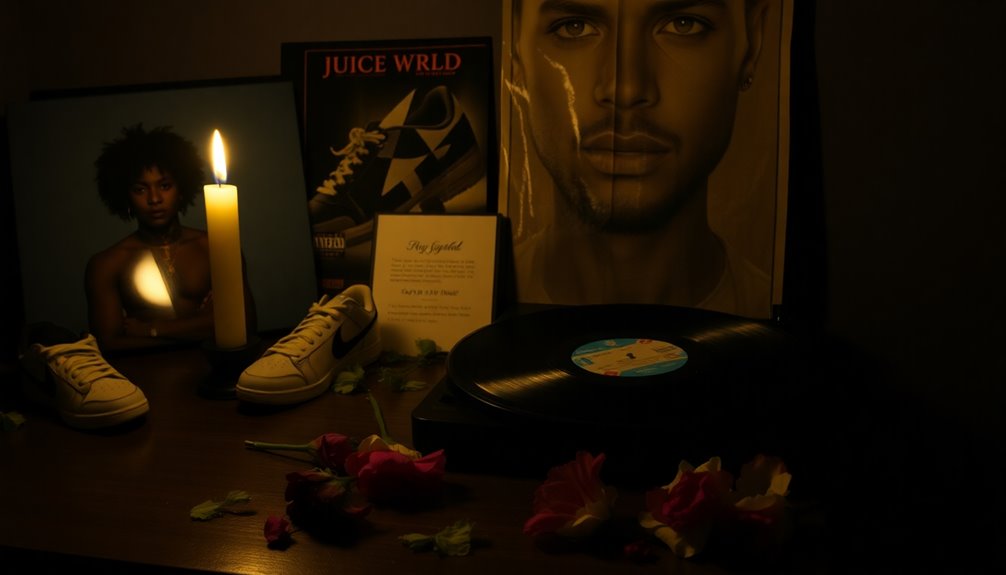Juice WRLD's tragic death on December 8, 2019, just days after celebrating his 21st birthday, still haunts fans grappling with the details. After landing in Chicago, he suffered seizures, allegedly having swallowed multiple pills to dodge a federal search that uncovered over 70 pounds of marijuana and prescription drugs. The autopsy confirmed an accidental overdose from oxycodone and codeine, highlighting the music industry's troubling relationship with substance abuse. While his family advocates for awareness and support, fans rally to share experiences and promote mental health. There are layers to his legacy that might surprise you, so stick around for more insights.
Key Takeaways
- Juice WRLD suffered seizures shortly after landing in Chicago, indicating the severity of his condition before being pronounced dead.
- The federal search revealed over 70 pounds of marijuana and firearms, raising concerns about substance use and artist safety.
- Juice WRLD allegedly swallowed multiple Percocet pills to avoid detection, highlighting the desperation often faced by those battling addiction.
- His music often reflected struggles with substance abuse, resonating deeply with fans and emphasizing the normalization of drug references in rap culture.
- The aftermath of his death prompted his family to advocate for addiction awareness and mental health support within the music industry.
Timeline of Juice WRLD's Death
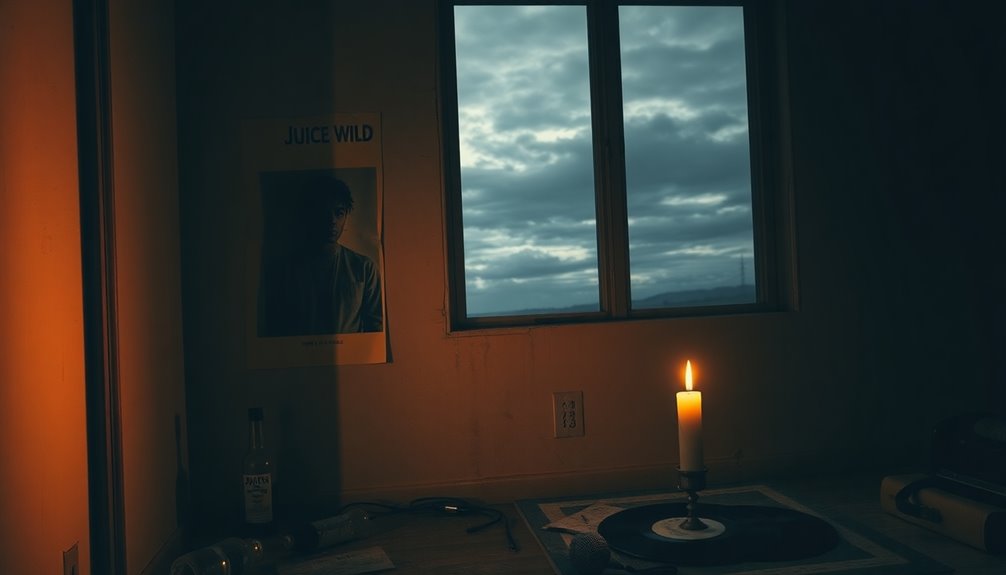
On December 8, 2019, just six days after his 21st birthday, Juice WRLD, born Jarad Higgins, was pronounced dead at 3:15 a.m. His tragic death marked a significant moment in the music industry, especially within the hip-hop community, as it brought to light the pervasive issues of drug addiction and substance abuse.
Earlier that night, Juice WRLD had just landed at Chicago Midway Airport from California. Shortly after his arrival, he suffered a medical emergency, including seizures, which prompted federal agents to search his private jet.
During this search, authorities discovered over 70 pounds of vacuum-sealed marijuana, prescription cough syrup, and firearms. Disturbingly, it was reported that Juice WRLD allegedly swallowed multiple Percocet pills to avoid detection.
The Cook County Medical Examiner later confirmed that his death was due to an accidental overdose from oxycodone and codeine, an unsettling reminder of the dangers posed by prescription drugs.
This heartbreaking incident serves as a wake-up call about the hidden struggles many face in the music industry, leaving fans and artists alike grappling with the painful loss of a talented young man whose life was cut far too short.
Medical Findings and Cause
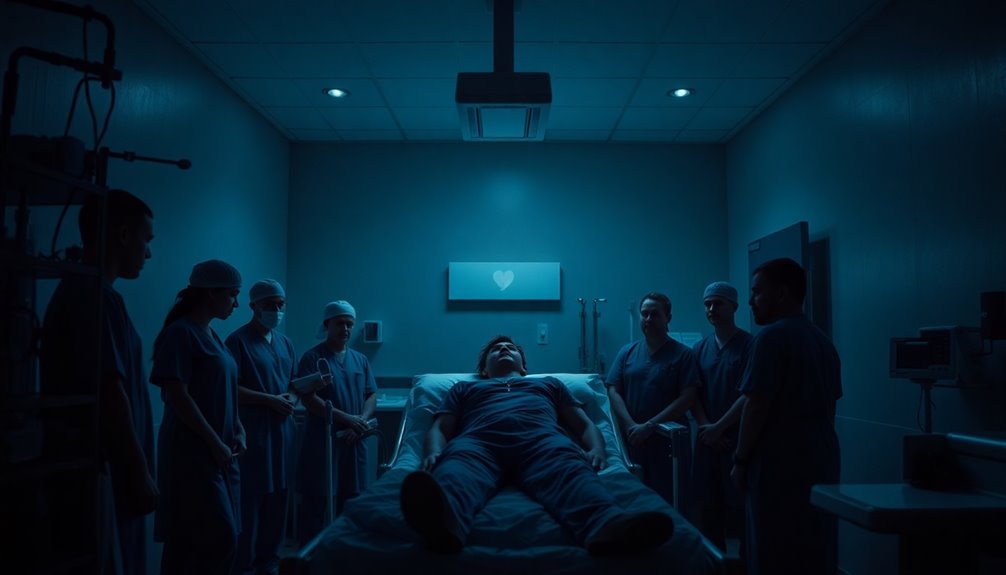
Now that you know the timeline leading up to Juice WRLD's tragic passing, let's unpack the medical findings surrounding his death.
The autopsy results revealed a mix of substances in his system, painting a vivid picture of the circumstances that led to that fateful night.
You'll discover how emergency responders reacted and the implications of the substances found, offering a clearer understanding of this heartbreaking story.
Autopsy Results Overview
The autopsy results revealed that Juice WRLD's tragic death was caused by an accidental overdose of oxycodone and codeine, as determined by the Cook County Medical Examiner on January 22, 2020.
This devastating news shocked fans and highlighted the serious issue of substance use among young artists. The initial autopsy findings pointed to the need for further toxicology and pathology tests to pinpoint the specific narcotics involved.
Juice WRLD was found to have significant levels of these narcotics in his system, emphasizing the severity of his substance use.
It's heartbreaking to think that, before his medical emergency, he allegedly swallowed multiple Percocet pills in an attempt to evade detection during a federal search.
Tragically, despite Narcan being administered by a federal agent on the scene to counteract the effects of opioids, Juice WRLD ultimately succumbed to a seizure linked to the overdose.
This tragic outcome serves as a stark reminder of the dangers surrounding substance use, particularly in high-pressure environments.
Juice WRLD's story resonates with many, urging us all to reflect on the impact of addiction and the importance of seeking help.
Substance Presence Analysis
Juice WRLD's tragic case underscores the harsh realities of substance use and its consequences. His official cause of death was determined to be an accidental overdose, primarily due to oxycodone and prescription codeine cough syrup, as revealed by the Cook County Medical Examiner. The toxicology report showed significant levels of narcotics in his system, highlighting the dangers of drug use, particularly in a world where opioids are so accessible. The presence of narcissistic behavior in some individuals can exacerbate substance abuse issues, as they may struggle with emotional manipulation and a lack of empathy. Additionally, the potential for juice cleanses to support recovery from addiction can be overlooked amidst the chaos of substance use. Incorporating adaptogenic herbs into recovery plans may help individuals manage stress and enhance resilience. Furthermore, the use of renewable energy sources can play a vital role in promoting healthier lifestyle choices by reducing reliance on substances linked to environmental factors.
During the medical emergency at Chicago Midway Airport, Juice WRLD experienced convulsions, a stark reminder of the physical toll such substances can take. It appeared he swallowed multiple Percocet pills just before authorities searched his plane, a desperate act to conceal his drug use.
Unfortunately, this decision led to a tragic outcome, with over 70 pounds of vacuum-sealed marijuana and numerous bottles of prescription cough syrup found onboard during the investigation.
This story serves as a cautionary tale about the risks associated with narcotics and the critical importance of awareness around substance abuse. Juice WRLD's death isn't just a statistic; it's a wake-up call for all of us. Moreover, it highlights the potential for long-term effects on mental health that can arise from substance abuse, which often complicates recovery processes.
Emergency Response Details
How did a night out turn into a medical emergency? Juice WRLD's tragic death on December 8, 2019, unfolded swiftly at Chicago Midway International Airport.
After swallowing multiple Percocet pills to dodge federal agents during a search of his private jet, he suffered a seizure. Despite the immediate emergency response, including the administration of Narcan by a federal agent, it was too late.
The Cook County Medical Examiner later confirmed the cause of death as an accidental overdose, revealing a troubling mix of oxycodone and codeine in his system.
This was no ordinary night; over 70 pounds of vacuum-sealed marijuana and numerous bottles of prescription cough syrup were also found on the plane.
Juice WRLD's struggle with substance use wasn't just a personal battle; it highlights a broader issue around prescription drugs and their dangers.
It's shocking to think how quickly a celebration turned into a somber reminder of the serious consequences of addiction.
The official autopsy results, released on January 22, 2020, only deepen the haunting questions surrounding his untimely death.
Legal Consequences and Reactions
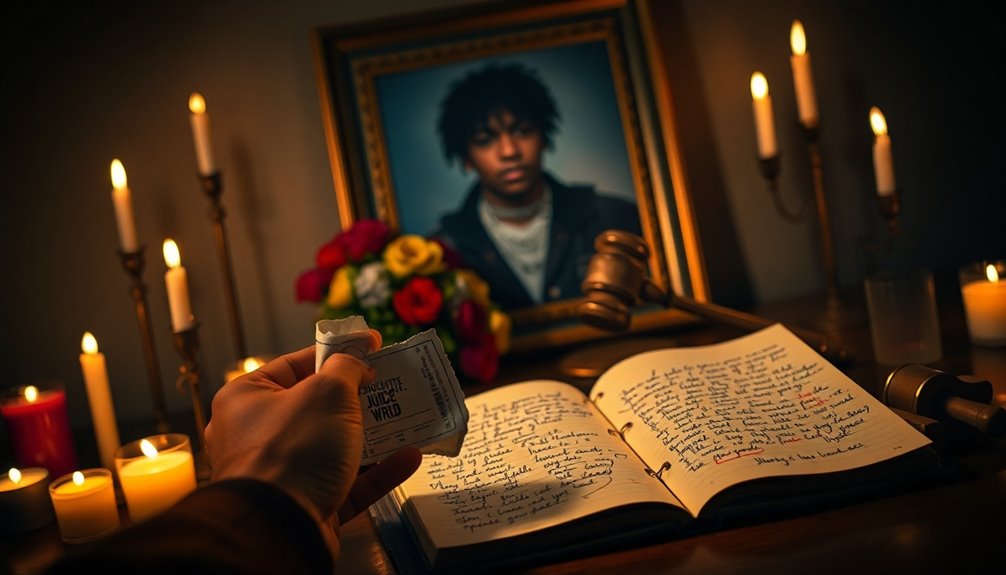
After Juice WRLD's tragic death, legal consequences quickly followed, with two bodyguards facing arrests for firearm possession, though one walked free without bail.
The investigation into the marijuana found on the private jet stirred significant concern, yet no charges were filed against his associates, leaving many questions unanswered.
Meanwhile, Juice WRLD's family openly grieved and pushed for an important conversation about addiction, highlighting the need for change in how we address these issues in the music industry.
Bodyguards' Arrests and Charges
The arrests of Juice WRLD's bodyguards at Chicago Midway Airport shed light on the legal consequences following the rapper's tragic death.
As federal agents conducted a search of the private jet, prompted by the pilot's alert about firearms, two bodyguards found themselves in hot water. One was released without bail shortly after the arrests, but the situation raised eyebrows and questions about the entourage's role during the chaotic moments leading to Juice WRLD's medical emergency.
While the focus was on the bodyguards and gun possession, the Chicago Police also investigated drug possession linked to the incident.
Thankfully, no charges were filed against Juice WRLD's entourage regarding the marijuana found on the plane. However, these arrests underscored the broader implications of addiction and the challenges Juice WRLD faced in life. His family expressed deep grief over the events, highlighting the heart-wrenching reality of losing someone to addiction.
In a way, these arrests serve as a reminder of the precarious nature of fame and the responsibilities that come with it, especially in high-pressure situations.
Juice WRLD's legacy will forever be intertwined with these events, haunting fans and loved ones alike.
Marijuana Investigation Outcome
In the wake of Juice WRLD's tragic death, the investigation into the marijuana discovered on his private jet took center stage, raising significant questions about legal accountability in the music industry. Authorities found over 70 pounds of vacuum-sealed marijuana, but surprisingly, no charges were filed against Juice WRLD's entourage. This lack of legal consequences for possession seems baffling, especially given the serious context surrounding his death.
| Individual | Legal Issue | Outcome |
|---|---|---|
| Juice WRLD's Entourage | Marijuana possession | No charges filed |
| Bodyguard 1 | Gun possession | Arrested, released without bail |
| Bodyguard 2 | Gun possession | Arrested, awaiting legal process |
The investigation also highlighted broader concerns about substance use in the music industry, especially regarding prescription drugs. While Juice WRLD himself faced no charges, the incident sparked conversations about accountability and the potential dangers artists encounter. Understanding these legal ramifications is essential as fans continue to mourn and reflect on his impact.
Family's Grief and Response
Juice WRLD's family is grappling with immense grief following his untimely death, deeply aware of how his struggles with addiction affected their lives.
They're determined to turn this pain into a powerful legacy, aiming to create change around substance abuse and mental health.
Here's how they plan to respond:
- Posthumous Music: They're set to release new tracks that honor his artistry while raising awareness about addiction.
- Public Tribute: A tribute in Chicago is in the works, celebrating his life and discussing mental health openly.
- Advocacy for Addiction Awareness: They want to spark conversations about the impact of addiction in the music industry.
- Support for Mental Health Initiatives: The family aims to collaborate with organizations focused on mental health, ensuring that Juice WRLD's story helps others.
The family's grief is profound, yet it fuels their commitment to addressing the stigma surrounding substance abuse.
Fan Reactions and Conspiracy Theories
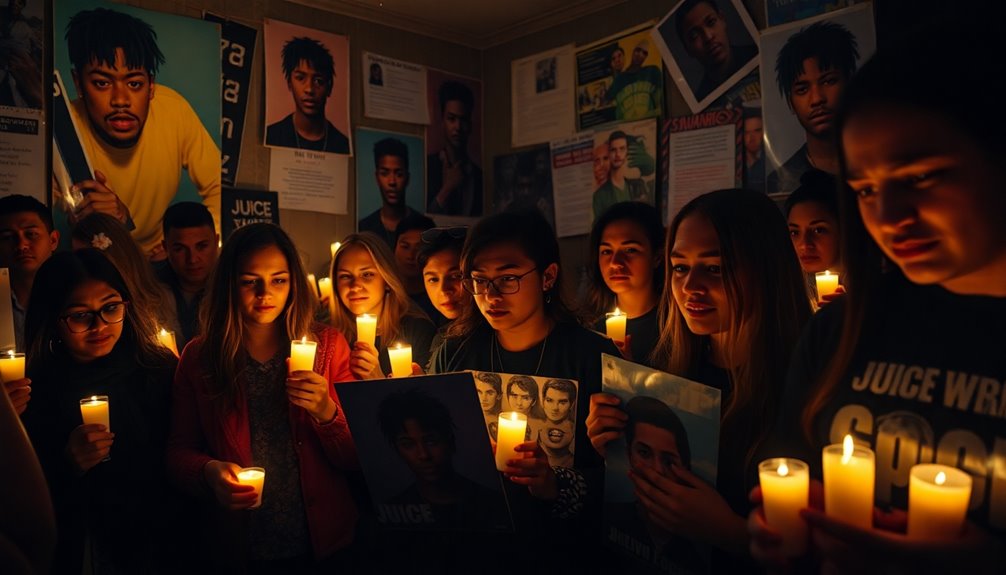
Fans flooded social media with disbelief and grief following Juice WRLD's death, sharing their personal connections to his music that often echoed themes of struggle and loss.
The emotional impact of his lyrics resonated deeply, prompting heartfelt tributes and stories of how his songs helped many cope with their own challenges. Many individuals found solace in his music, often using essential oils for stress relief to manage their emotions during tough times. Additionally, effective relaxation techniques such as deep breathing and mindfulness practices can also provide comfort in moments of grief. The importance of self-love in attracting ideal partners can also parallel the need for self-acceptance in coping with grief. Moreover, the emotional turmoil surrounding such losses can lead to a greater awareness of mental health struggles in society.
However, in the wake of this tragedy, conspiracy theories began to swirl, with some speculating that Juice WRLD faked his death. This was fueled by a 2017 tweet where he mentioned the age of 21, which his family later clarified was a misunderstanding.
Many fans also questioned the circumstances surrounding Juice WRLD's death, focusing on issues like drug dependency and the pressures of fame in the music industry. Emotional alignment often plays a crucial role in navigating such challenging situations.
Conversations about mental health became more prevalent, as fans rallied for greater awareness and support for artists grappling with similar struggles.
Juice WRLD's family confirmed his battles with addiction, sparking an essential dialogue about substance abuse's normalization in hip-hop culture. Additionally, discussions around risk management strategies for artists can help raise awareness about the importance of addressing mental health and addiction in the industry.
These fan reactions reveal not only the profound loss felt but also a growing demand for open discussions about mental health and drug dependency in today's society.
Impact on the Music Industry
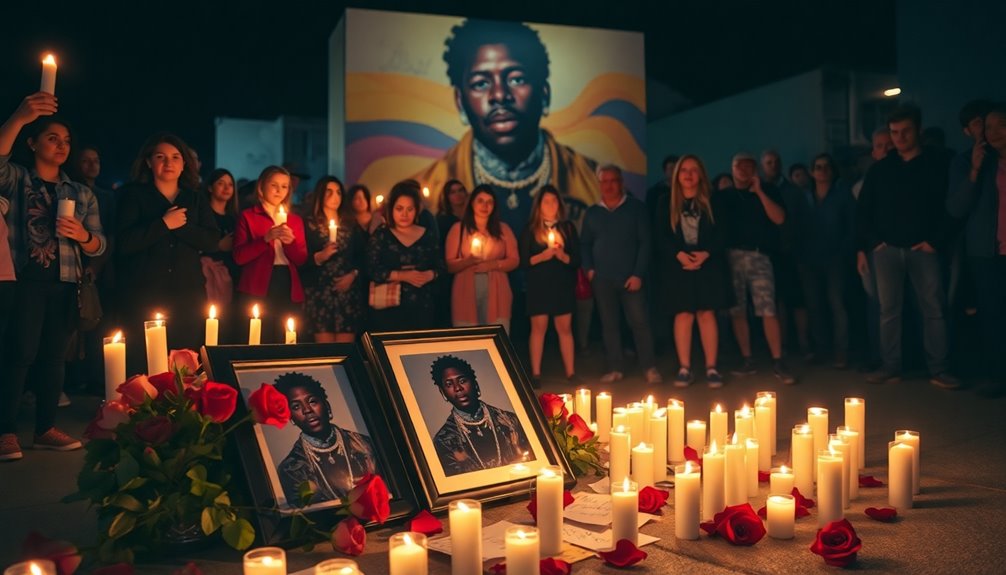
The shockwaves from Juice WRLD's death reverberated throughout the music industry, sparking urgent conversations about the alarming substance abuse crisis affecting young artists. His untimely passing at just 21 highlighted the intense pressures these artists face, especially within the SoundCloud rap scene.
The impact goes way beyond his music; it's a wake-up call for everyone involved.
Here are four key points to reflect upon:
- Cries for Help: Juice WRLD's lyrics often reflected his struggles with addiction and mental health, resonating deeply with fans.
- Vows for Change: Many artists, like Trippie Redd and Future, vowed to reassess their substance use after Juice WRLD's death, recognizing the toxic drug culture in their circles.
- Increased Scrutiny: The industry is now under the microscope, facing pressure to prioritize the mental health and well-being of young talent.
- Future of SoundCloud Rap: With the loss of influential figures, concerns grow about the direction this genre will take.
This substance abuse crisis isn't just a personal battle; it's a collective responsibility.
Juice WRLD's legacy urges us to take action.
Legacy and Posthumous Releases
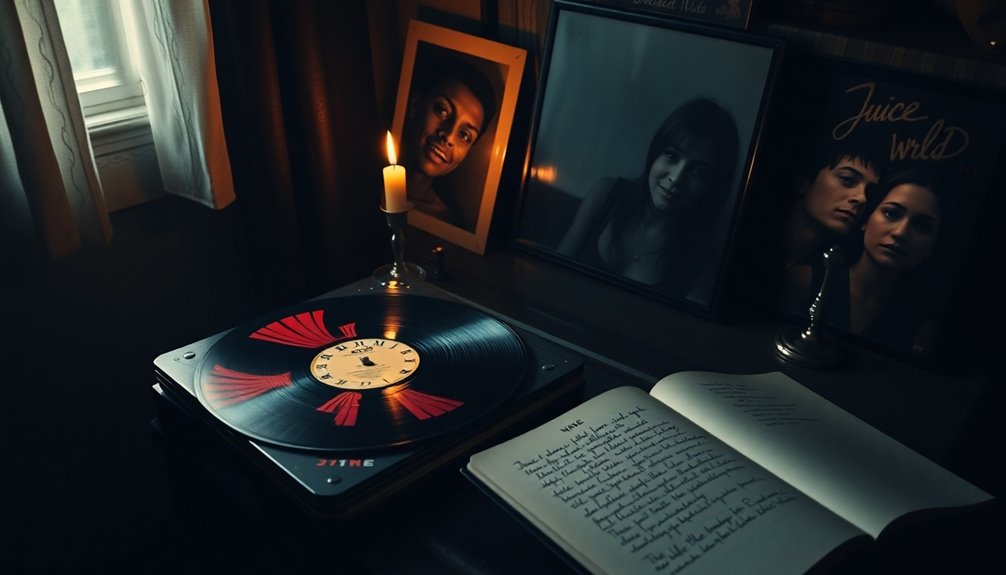
Since his passing, Juice WRLD's legacy has only grown stronger, resonating deeply with both old fans and new listeners. The posthumous album "Legends Never Die" debuted at number one on the Billboard charts, showcasing his ability to connect through music that explores heartbreak and struggles with addiction. You can feel the raw emotion in each track, revealing Juice WRLD's private battles that many relate to.
Following his death, unreleased tracks and collaborations emerged, generating millions of streams and reminding everyone of his unique voice as a rapper. His family is committed to honoring his legacy by releasing more posthumous music, ensuring his message continues to inspire. This ongoing flow of music keeps conversations alive around mental health and addiction, encouraging artists and fans alike to tackle these vital issues head-on. Emotional neglect can often exacerbate the struggles faced by individuals dealing with addiction, highlighting the importance of support systems. Additionally, recognizing early detection of mental health issues can play a crucial role in prevention and intervention.
Juice WRLD's influence remains palpable, with many artists citing him as a major inspiration. His work has helped shape the emo rap genre, and you can see how his themes resonate in the music of both established and emerging artists today.
Juice WRLD's legacy isn't just about his music; it's about the conversations he sparked and the lives he touched.
Cultural Reflection on Addiction

Addiction, a pervasive issue in contemporary society, became painfully evident with Juice WRLD's tragic passing. His death from an accidental overdose highlighted the opioid crisis affecting millions, igniting conversations about addiction in rap music.
Juice WRLD's lyrics often reflected his own struggles with substance abuse and mental health, resonating with fans who face similar battles.
Here are four key points to reflect upon regarding this cultural reflection:
- Normalization of Drug Culture: Juiced by artists like Juice WRLD, drug references have become commonplace in rap music, blurring the lines between glamorization and reality.
- Impact on Youth: The tragic trend of young artists, often dubbed the "21 Club," mirrors societal pressures that influence youth behavior and mental health.
- Cultural Shift: His work has sparked a cultural shift toward recognizing addiction as a vital issue rather than a taboo subject.
- Industry Responsibility: Following his death, the music industry faced scrutiny over its role in glorifying substance abuse, calling for more support for struggling artists.
Juice WRLD's legacy serves not just as a reminder of loss but as a catalyst for a broader discussion on addiction and its impact on society. Additionally, the connection between mental health challenges and substance abuse underscores the necessity for open dialogue and support systems for those in distress.
Community Support and Awareness
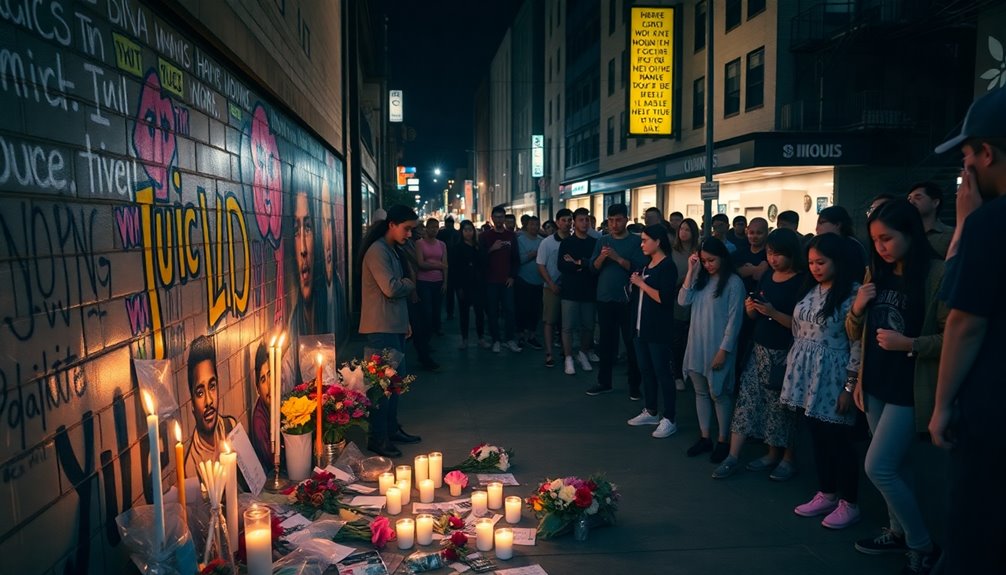
Raising awareness about mental health and addiction became a powerful movement following Juice WRLD's untimely death. Fans united to create community support networks that emphasized the importance of open conversations about these critical issues. His music resonated deeply with many, reflecting the struggles of addiction and mental health that often go unspoken. Studies indicate higher rates of anxiety and depression in individuals affected by substance abuse, which further underscores the need for awareness. Additionally, many individuals found comfort in using natural remedies, such as turmeric's anti-inflammatory properties, to help manage the emotional pain associated with their struggles.
Moreover, dreams as a reflection of our vibrational state can provide insights into the emotional challenges faced by those dealing with addiction.
Memorial events sprang up, honoring Juice WRLD's legacy while also serving as platforms for addiction awareness and compassion. Social media transformed into a crucial space for fans to share their own experiences, promoting messages of sobriety and wellness. Many individuals found solace through support networks that encouraged emotional expression and connection.
This collective mourning not only paid tribute to Juice WRLD but also highlighted the urgent need for proactive measures within the music industry to address substance abuse. His family and collaborators have taken on the mantle of advocacy, using posthumous releases to shed light on addiction's challenges. Clear communication during these difficult times is essential for fostering understanding and support.
Through these efforts, you see the power of community support in action. It's a reminder that compassion can spark change. By coming together, fans aren't just remembering Juice WRLD; they're also transforming pain into purpose, encouraging others to seek help and fostering an environment where mental health struggles are acknowledged and understood.
Frequently Asked Questions
What Is the Information on Juice Wrld's Death?
Juice WRLD, whose real name was Jarad Higgins, tragically passed away on December 8, 2019, at just 21 years old.
He suffered an accidental overdose of oxycodone and codeine after a seizure at Chicago Midway Airport.
This heartbreaking event highlighted the ongoing opioid crisis and the struggles many artists face with addiction.
His death serves as a significant reminder of the need for better support for mental health and substance abuse in the music industry.
What Was Juice Wrld's Final Song?
So, you're curious about Juice WRLD's final song—well, grab your headphones!
It's "Come & Go," a collaboration with Marshmello that dropped posthumously in July 2021. This track captures Juice WRLD's emotional struggles with its melodic rap and poignant lyrics, showcasing his unique style.
Recorded just before his passing, it became a part of his album "Fighting Demons," debuting at number two on the Billboard 200. Quite the legacy, right?
What Did Juice Wrld Say at His Last Concert?
At his last concert, Juice WRLD shared his feelings about mental health, telling fans, "I feel like I'm losing my mind."
He connected with the audience, expressing gratitude by saying, "I love you guys, you guys are my family."
His performance included emotional hits like "Lucid Dreams," revealing his vulnerability.
Juice also remarked, "Life is all about balance," highlighting the struggle between happiness and sadness, a sentiment that resonated deeply with his fans.
How Much Money Did Juice Have When He Died?
You might be surprised to learn that Juice WRLD had an estimated net worth of around $4 million when he passed away.
This wealth came from his booming music career, including the massive success of "Lucid Dreams."
In the year before his death, he raked in about $15 million through touring and streaming.
His estate's value has only grown since, thanks to ongoing royalties and a surge in fan interest after his untimely passing.
Conclusion
In the end, Juice WRLD's story serves as a stark reminder that "the pen is mightier than the sword." His music continues to resonate, sparking conversations about addiction and mental health, urging us to reflect on our struggles. As fans, we honor his legacy by supporting awareness and community efforts, ensuring that his impact lives on. While his passing left a void, it also ignited a movement, reminding us that every voice matters in this ongoing dialogue.
